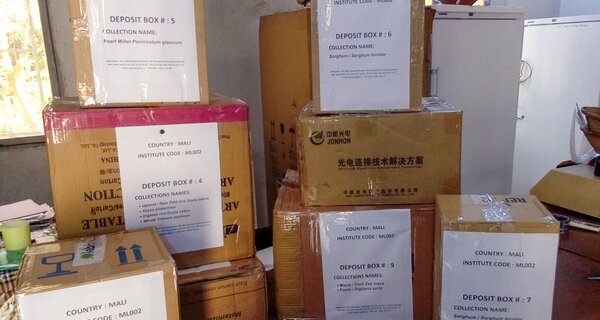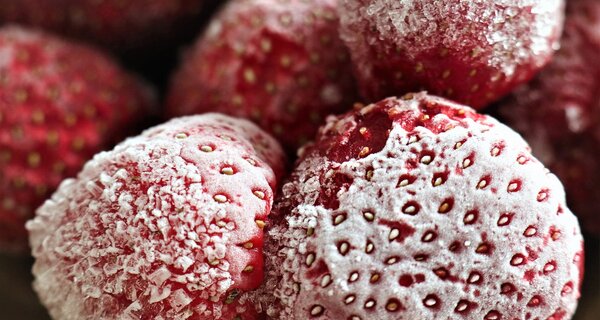Svalbard Global Seed Vault Celebrates 15th Year With Historic Deposit
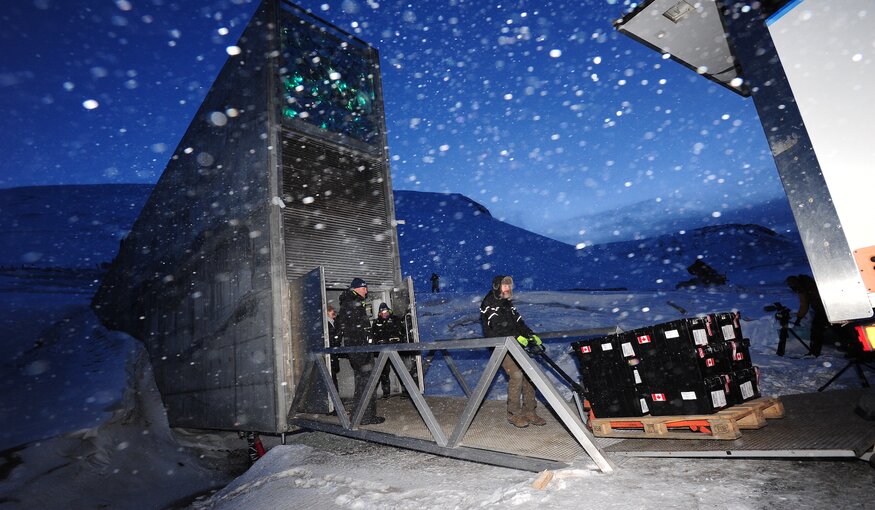
28 February 2023
Longyearbyen, Svalbard, 28 February 2023 – As part of its 15th anniversary celebrations, today the Svalbard Global Seed Vault welcomes 20 genebank depositors. 19,585 seed samples will enter the Seed Vault, including collections from first-time depositors from Albania, Croatia, North Macedonia, and Benin, and a new virtual tour is launched.
Set 120 meters inside an Arctic mountainside on remote Spitsbergen Island, the Seed Vault,will now house over 1.2 million seed samples, making it the world’s largest crop diversity collection in a single location.
“From here in Svalbard, the world looks different. This Seed Vault represents hope, unity and security” says Stefan Schmitz, Executive Director of the Crop Trust. “In a world where the climate crisis, biodiversity loss, natural catastrophes and conflicts increasingly destabilize our food systems, it has never been more important to prioritize safeguarding these tiny seeds that hold so much potential to adapt our future food to such global threats.”
The deposit includes 290 samples of maize, wheat and beans from the Institute of Plant Genetic Resources of Albania, and over 1600 samples, including wild relatives (cousins of current food crops) of rice and watermelon, from the Institut d’Economie Rurale in Mali. In addition, the International Crops Research Institute for the Semi-Arid Tropics (ICRISAT) in India will deposit 4000 samples, including sorghum, chickpea, and groundnut.
The Seed Vault will also receive its first deposit from the non-governmental organization Fabia CSB Bogdanci in North Macedonia. It includes seed varieties used in celebrated national dishes, such as the ajvarka red pepper variety used to make traditional ajvar, a popular relish.
Four deposits were made possible thanks to support from the Biodiversity for Opportunities, Livelihoods and Development (BOLD) Project, a global 10-year initiative to strengthen global food and nutrition security funded by the Government of Norway and led by the Crop Trust.
Through grants issued as part of the BOLD project, seed collections from almost 30 countries will be supported in regenerating their seeds, thus making safety duplication possible. Importantly, this also means these genebanks have fresh seeds to share with their users -- farmers, breeders, researchers and others. Historically, the Seed Vault's depositors have been international, regional and national genebanks. With this grant, many genebanks managed by communities, universities and NGOs based in low- and middle-income countries now have the opportunity to back up their unique crop diversity.
“New genebank deposits are vital to preserving the genetic diversity of staple crops and regional seed varieties that small-scale farmers rely on'' Says Sandra Borch, Minister of Agriculture and Food for Norway “With this latest deposit, marking the 15th anniversary of the Seed Vault, we will have a safety backup of the world's crop diversity of approximately 1.2 million seeds stored in the vault. The whole of humanity relies on the genetic diversity of crops maintained in the world’s genebanks, and the Seed Vault is the last line of defence against the loss of that diversity.”
As part of the 15th anniversary, the Julius Kühn Institute will deposit wild strawberries. The Millennium Seed Bank at Kew Gardens will deposit beets, carrots and bumblebee-friendly clover seed varieties. Once delivered safely to the Seed Vault, the seed samples will join the tens of thousands already stored in the subterranean seed chambers at temperatures of around −18°C.
Entering the Seed Vault, virtually.
To mark its 15th anniversary, the Svalbard Global Seed Vault is also opening its doors to the world -- virtually -- by launching a new virtual tour that accompanies the latest deposits.
The global public will now have the opportunity to experience the inside of the remote Seed Vault. They will be able to explore the diversity its seed chambers hold, including boxes of seed samples from all over the planet, from North Korea to India to Peru.
The virtual tour follows the route seed boxes take, all the way from the iconic entrance to down into the depths of the mountain out of which the seed chambers are hewn. The tour was developed by the Seed Vault partners – Norway’s Ministry of Agriculture, the Crop Trust and NordGen – working with the UK-based Virtual Tour Company.
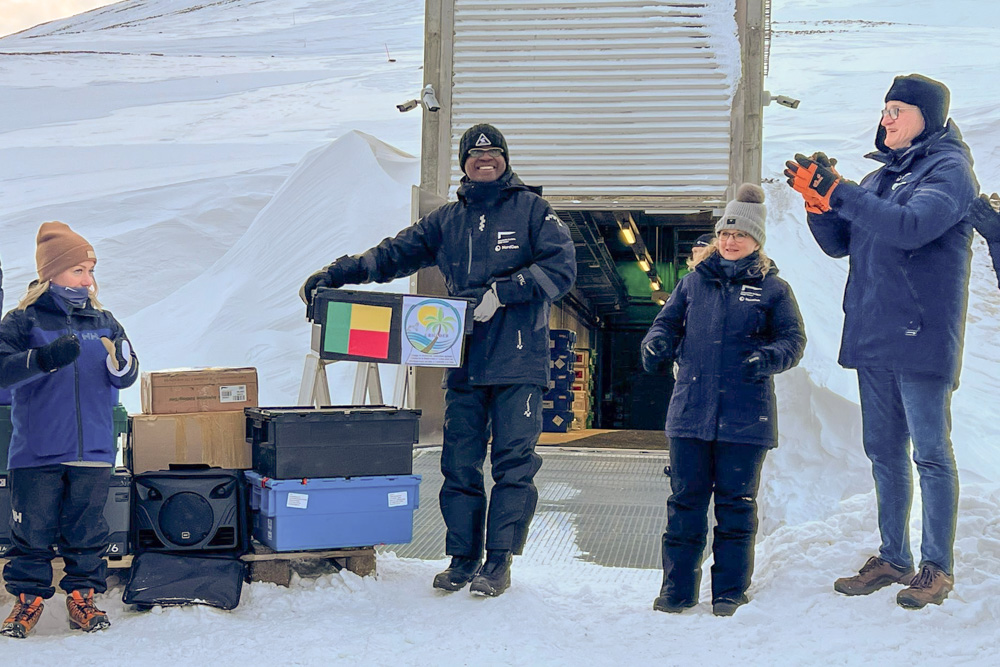
Innocent Dossou Aminon, from the NGO GRIGADEB in Benin, deposited 427 accessions of seven crops.
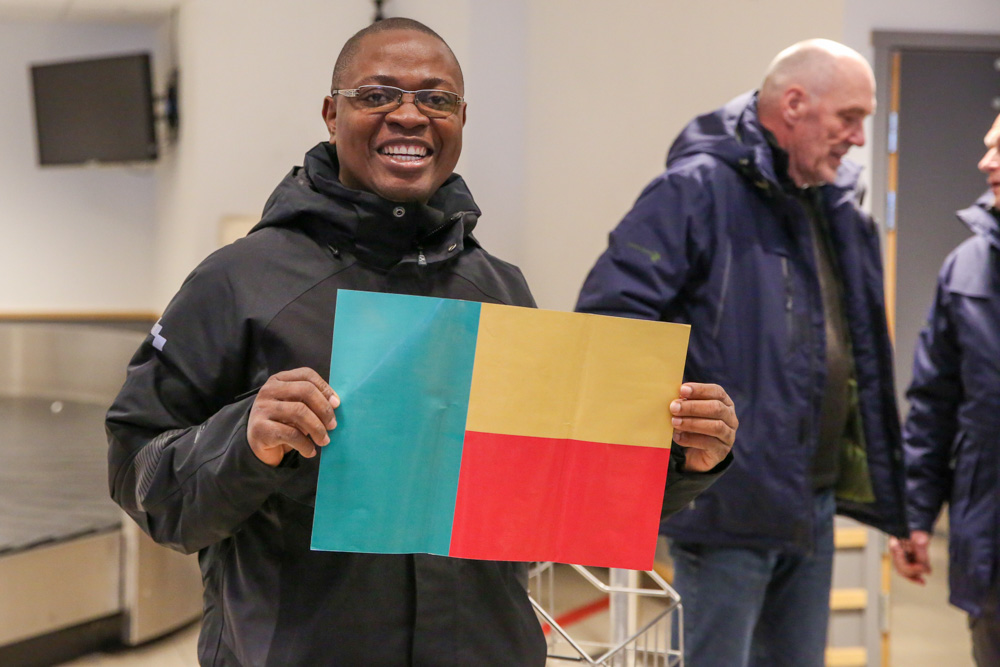
Innocent Dossou Aminon, from the NGO GRIGADEB in Benin, flew for two days to reach Svalbard. He brought a diverse selection of seeds to make Benin's first backup at the Seed Vault. The deposit is possible thanks to the support from the Crop Trust's #BOLDcrw project.
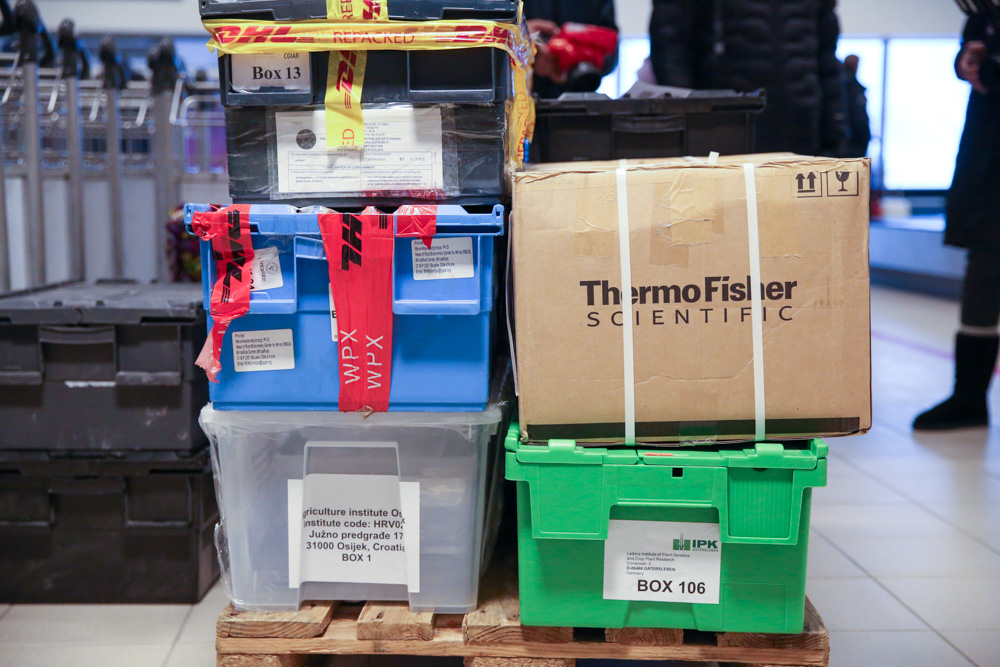
The deposit on 28 Feburary includes seeds from 20 genebanks, including five new depositors (Albania, Benin, Croatia, Mali and North Macedonia)
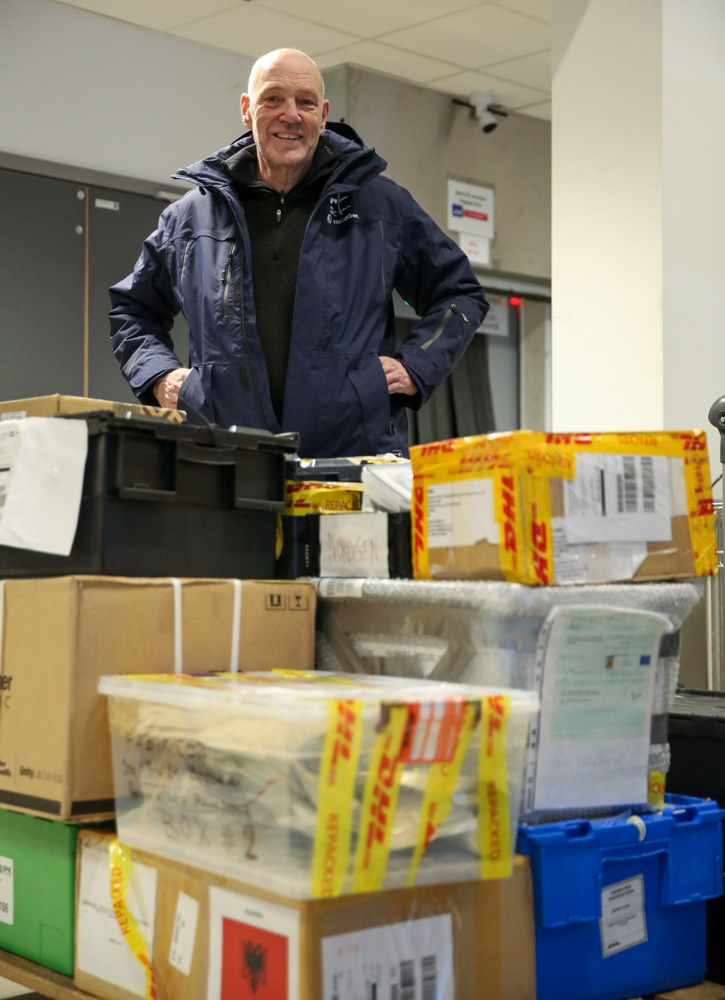
Seed Vault Coordinator Åsmund Asdal, from NordGen welcomes the seed boxes for the first 2023 deposit. The deposit on 28 Feburary includes seeds from 20 genebanks, including five new depositors (Albania, Benin, Croatia, Mali and North Macedonia)
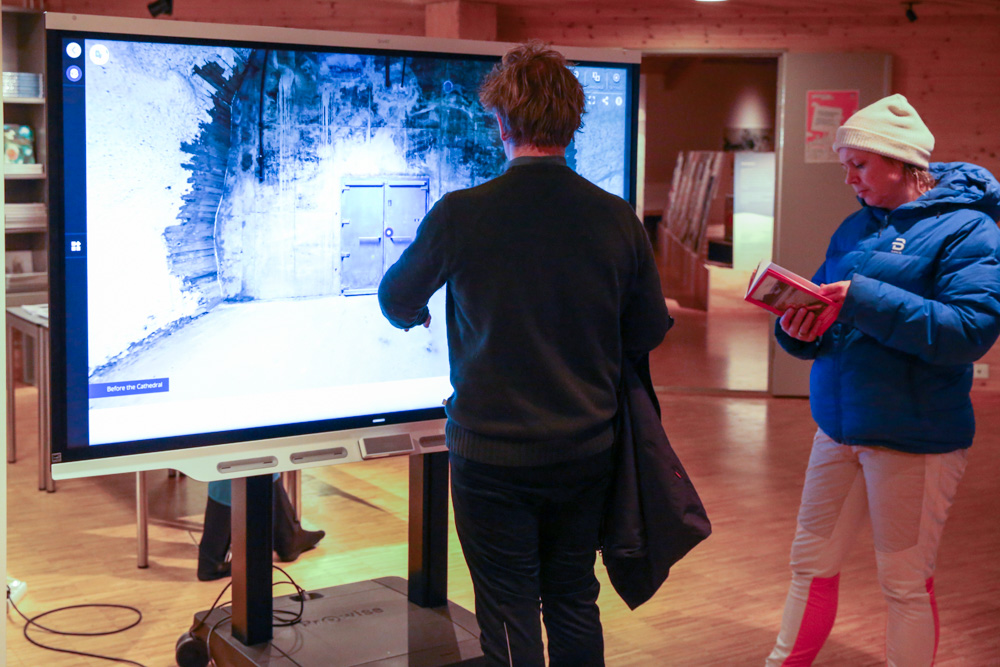
The new virtual tour of the Svalbard Global Seed Vault has been launched.
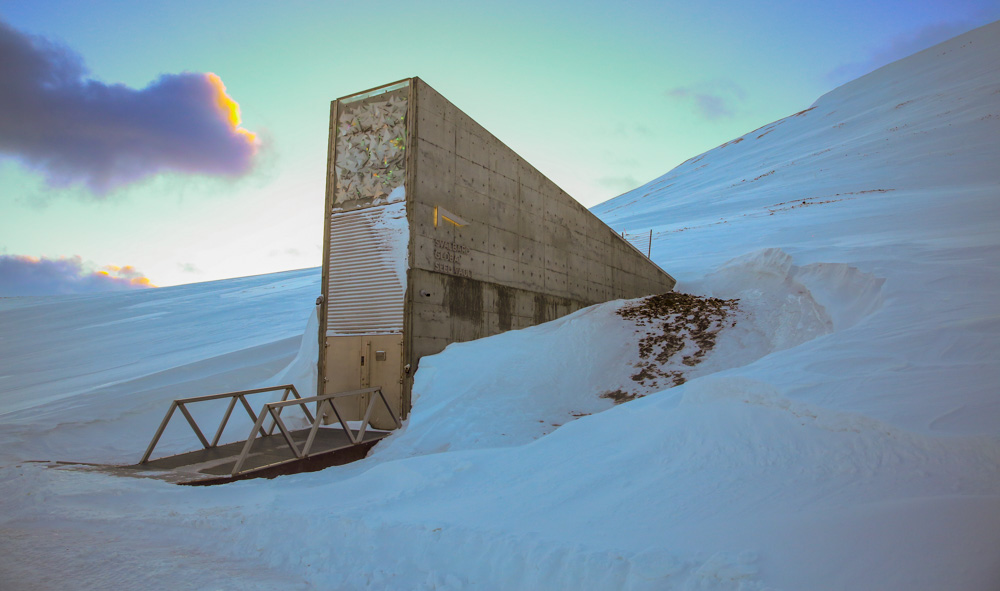
“The Seed Vault still takes my breath away every time I enter – and not just because of the cold. It protects the foundation of our future food supply” says Lise Lykke Steffensen, Executive Director of NordGen. “Genebanks are working tirelessly to protect key crops that are increasingly vulnerable, whether it be from natural disasters, conflicts or other challenges. By offering a place where the genebanks can back up their invaluable and unique seed samples, the Svalbard Global Seed Vault creates a higher level of security for the world's agricultural biodiversity and, thereby, our global food security”
The purpose of the Seed Vault is to back up the crop diversity stored in – and made available by – the world’s genebanks. These collections are essential for researchers and plant breeders who develop new plant varieties crucial for adapting our agriculture to climate change, new pests and diseases, changed production methods or new dietary demands. If the original genebank collections are destroyed or made inaccessible due to war, floods, fires or even a power shortage, the backup seeds in the Seed Vault will prevent invaluable and unique crop biodiversity from being lost forever.
Keeping all the seeds safe requires stringent security, with only a handful of staff members allowed inside the Seed Vault. However, the new interactive virtual tour will provide everyone with the chance to explore the mysterious arctic seed store and learn about the enormous breadth and variety of samples stored there, on which our global future food security rests.


